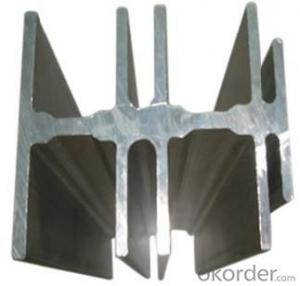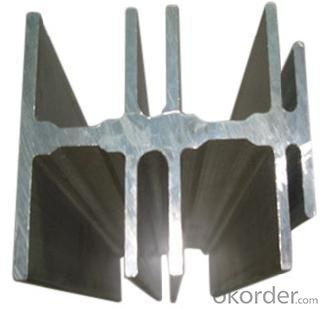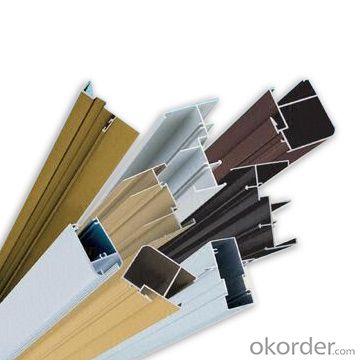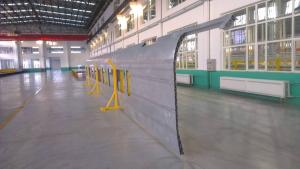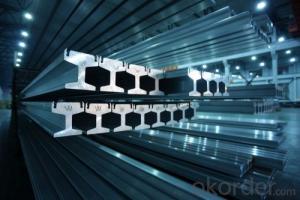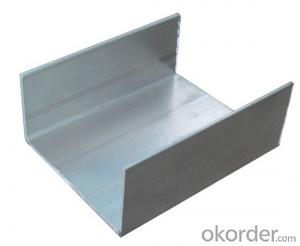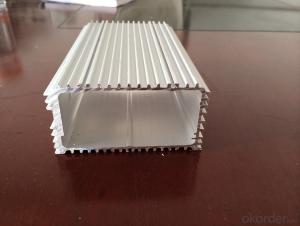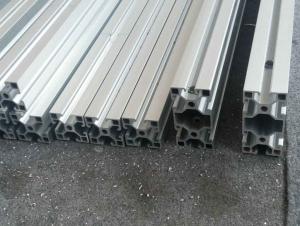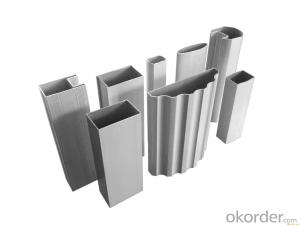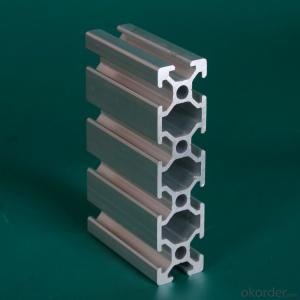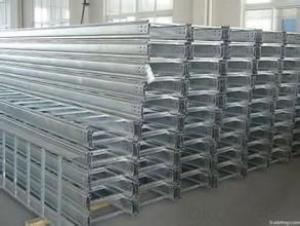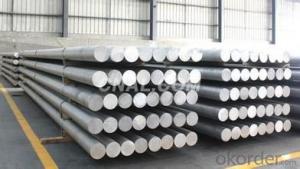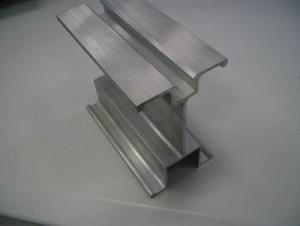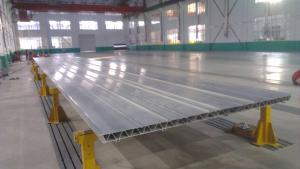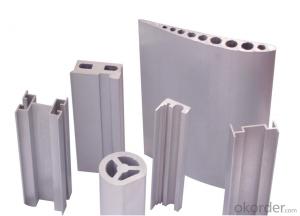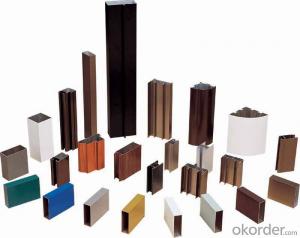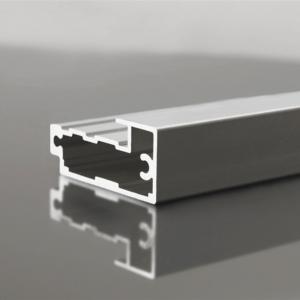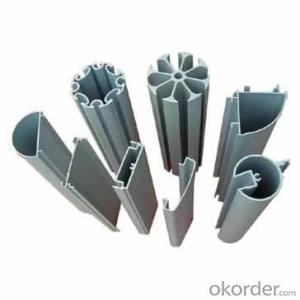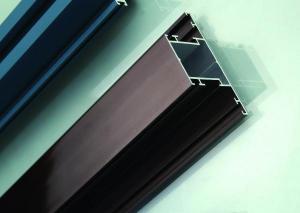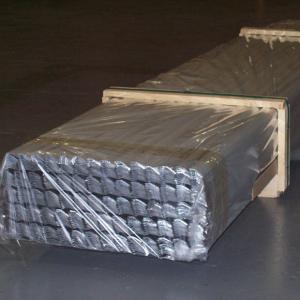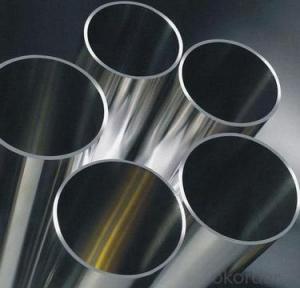Aluminum Extrusion Profiles Philippines for Any Use of Construction
- Loading Port:
- Shanghai
- Payment Terms:
- TT OR LC
- Min Order Qty:
- 1 m.t.
- Supply Capability:
- 1000 m.t./month
OKorder Service Pledge
OKorder Financial Service
You Might Also Like
Aluminium is a relatively soft, durable, lightweight, ductile and malleable metal with appearance ranging from silvery to dull gray, depending on the surface roughness. It is nonmagnetic and does not easily ignite. A fresh film of aluminium serves as a good reflector (approximately 92%) of visible light and an excellent reflector (as much as 98%) of medium and far infrared radiation. The yield strength of pure aluminium is 7–11 MPa, while aluminium alloys have yield strengths ranging from 200 MPa to 600 MPa. Aluminium has about one-third the density and stiffness of steel. It is easily machined, cast, drawn and extruded.
Aluminium alloys (or aluminum alloys; see spelling differences) are alloys in which aluminium (Al) is the predominant metal. The typical alloying elements are copper, magnesium, manganese, silicon, tin and zinc. There are two principal classifications, namely casting alloys and wrought alloys, both of which are further subdivided into the categories heat-treatable and non-heat-treatable.
Material | Alloy 6063,6061,6005or according to customer’s choice |
Temper | T3, T4, T5, T6 |
Surface | Anodize, electrophoresis, powder coating, PVDF coating, wood grain painting, matted, etc. |
Length | Coating 6.5 meters, Anodizing 6.5 meters, Mill finish 5-6 meters |
Application | Industrial, electrical equipment(TV set, air conditioner, refrigerator, computer), decoration,construction, transportation |
Custom Made | We can package following with customer's request. |
Products are exported to United States, Canada, U.A.E, Brazil, Mexico,Thailand, Vietnam, Nigeria etc, over 100 countries and regions all over the world.
FAQ:
1. What is the form of payment?
Normally 30% TT, L/C
2. Type of quotation?
FOB, CFR, CIF
3. Port of loading?
Shanghai port
4. Delivery time?
20 day after client’s deposit
- Q: Can aluminum profiles be used in window and door manufacturing?
- Yes, aluminum profiles can be used in window and door manufacturing. Aluminum is a popular material choice for window and door frames due to its many advantages. It is lightweight, durable, corrosion-resistant, and offers excellent strength-to-weight ratio. Aluminum profiles can be easily shaped and customized to fit various window and door designs, allowing for flexibility in manufacturing. Additionally, aluminum frames are low maintenance, requiring little upkeep over their lifespan. They also have excellent thermal and sound insulation properties, making them energy-efficient and capable of reducing noise transmission. Overall, aluminum profiles are widely used in window and door manufacturing due to their versatility, durability, and performance benefits.
- Q: Are aluminum profiles suitable for use in automotive engine components?
- Yes, aluminum profiles are suitable for use in automotive engine components. Aluminum is lightweight, which helps improve fuel efficiency and reduce emissions. It also has good heat conductivity, allowing for efficient heat dissipation in engine components. Additionally, aluminum profiles offer excellent strength and durability, making them suitable for withstanding the demanding conditions of an automotive engine.
- Q: This question asks for an overview of the typical materials used in the production of aluminum profiles.
- <p>Aluminum profiles are commonly made from various aluminum alloys, each with specific properties suited for different applications. The most common materials include 6063 aluminum alloy, known for its good mechanical properties and corrosion resistance, making it ideal for construction and industrial applications. 6061 aluminum alloy is also widely used due to its high strength-to-weight ratio and is often found in aerospace and automotive industries. Other alloys such as 6082 and 7075 are used for their superior strength and are common in heavy-duty applications. Each alloy is chosen based on the required strength, weight, and resistance to environmental factors for the intended use of the aluminum profile.</p>
- Q: How are the aluminum and aluminum sections joined?
- The frame structure is connected with special connecting pieces according to different specifications, and your graphic 40*40 can only be connected through an outer connecting piece. You can go to the profile dealer to purchase the relevant accessories.
- Q: How do you prevent galvanic corrosion when combining aluminum profiles with other metals?
- To prevent galvanic corrosion when combining aluminum profiles with other metals, several measures can be taken. One effective method is to use a barrier between the aluminum and the other metal, such as a coating or a non-conductive material. This barrier helps to isolate the two metals and prevents direct contact, reducing the risk of galvanic corrosion. Additionally, selecting metals with similar electrochemical properties can minimize the potential for galvanic corrosion. Proper insulation and regular maintenance, including ensuring the absence of any electrolytes or moisture, can also help prevent galvanic corrosion in these combinations.
- Q: What are the advantages of using aluminum profiles in transportation vehicles?
- There are several advantages of using aluminum profiles in transportation vehicles. Firstly, aluminum is a lightweight material, which helps to reduce the overall weight of the vehicle. This, in turn, improves fuel efficiency and reduces emissions. Additionally, aluminum profiles offer excellent strength-to-weight ratio, providing structural integrity and safety to the vehicle. Aluminum is also corrosion-resistant, ensuring durability and longevity of the vehicle. Moreover, aluminum profiles can be easily fabricated, allowing for flexible and efficient manufacturing processes. Overall, the use of aluminum profiles in transportation vehicles brings benefits such as improved fuel efficiency, enhanced safety, and increased durability.
- Q: Are aluminum profiles resistant to mold or mildew?
- Yes, aluminum profiles are resistant to mold and mildew. The inherent properties of aluminum make it highly resistant to the growth of mold and mildew. Unlike other materials such as wood, which can be susceptible to moisture damage and thus promote the growth of mold and mildew, aluminum is not prone to these issues. Additionally, aluminum profiles are often treated with protective coatings or finishes that further enhance their resistance to mold and mildew. This makes aluminum profiles a suitable choice for areas that are prone to high humidity or moisture, such as bathrooms or kitchens, where the growth of mold and mildew is a common concern.
- Q: How do aluminum profiles contribute to water management strategies?
- Aluminum profiles play a crucial role in water management strategies due to their inherent properties and versatility. These profiles are commonly used in the construction of various water management infrastructure such as pipes, channels, and tanks, among others. Firstly, aluminum profiles are lightweight yet sturdy, making them ideal for constructing water pipes. Their lightweight nature allows for easy transportation and installation, while their strength ensures durability and resistance to corrosion. This is particularly important in water management systems as it reduces the risk of leaks and damages, ensuring the efficient and effective transport of water resources. Secondly, aluminum profiles are highly resistant to corrosion. Corrosion is a major concern in water management as it can contaminate water, reduce its quality, and damage infrastructure. By utilizing aluminum profiles, the risk of corrosion is significantly reduced, leading to improved water quality and longevity of the infrastructure. Additionally, aluminum profiles are highly customizable and can be fabricated into various shapes and sizes, allowing for the creation of efficient water management systems. These profiles can be used to construct channels, culverts, and tanks, which are crucial components of water management infrastructure. The versatility of aluminum profiles enables engineers and designers to create efficient and effective systems that can handle large volumes of water, ensuring proper water management in various scenarios such as irrigation, flood control, and wastewater treatment. Moreover, aluminum is a sustainable material that can be recycled indefinitely without losing its properties. This makes aluminum profiles an environmentally friendly choice, aligning with sustainable water management practices. By using aluminum profiles, water management strategies can minimize their environmental impact and contribute to a more sustainable future. In summary, aluminum profiles have a significant impact on water management strategies. Their lightweight yet sturdy nature, corrosion resistance, versatility, and sustainability make them indispensable in the construction of water management infrastructure. By utilizing these profiles, water management systems can be built to efficiently and effectively handle water resources, reducing the risk of contamination, improving water quality, and promoting sustainability.
- Q: What does "3030W" W mean for European standard industrial aluminum?
- This refers to the 3030 heavy aluminum profiles. General aluminum profile manufacturers will make a number of their own products, European standard 3030 series has a variety of specifications, such as Jing Teng aluminum European standard 3030R, referring to the European standard 3030 fan, 3030G refers to the 3030 GB profiles. In short, look at your own needs,
- Q: Are aluminum profiles energy-efficient?
- Certainly, aluminum profiles are regarded as energy-efficient. Being a highly conductive material, aluminum has the ability to efficiently transfer heat or cold. This characteristic enables aluminum profiles to offer outstanding thermal insulation, effectively reducing energy loss and ensuring a steady indoor temperature. Furthermore, aluminum profiles can be constructed with thermal breaks, which enhance their energy efficiency by diminishing heat transfer between the interior and exterior of a building. These attributes make aluminum profiles a favored option for windows, doors, and other building elements, as they actively contribute to energy conservation and mitigate a structure's overall carbon footprint.
Send your message to us
Aluminum Extrusion Profiles Philippines for Any Use of Construction
- Loading Port:
- Shanghai
- Payment Terms:
- TT OR LC
- Min Order Qty:
- 1 m.t.
- Supply Capability:
- 1000 m.t./month
OKorder Service Pledge
OKorder Financial Service
Similar products
Hot products
Hot Searches
Related keywords
